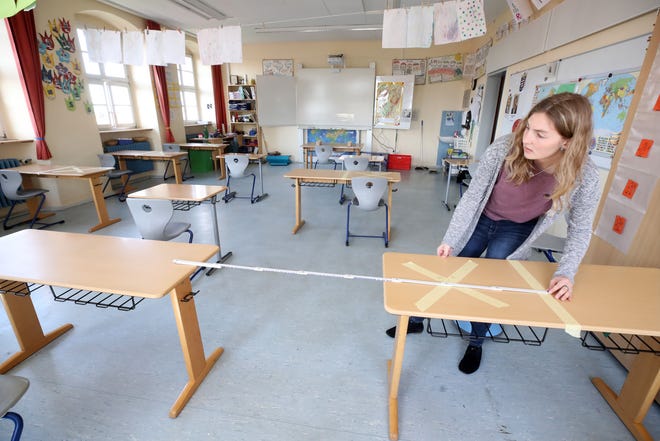Children over 12 years of age will go to school on alternate days if social distancing cannot be guaranteed. This was the recommendation that the Ministry of Education made to communities in a document that was distributed recently.
The Government is recommending a blended model of education with rotating shifts when it is not possible to ensure 1.5 metres
The document presented by the Ministry of Education for the organization of the next school year has been widely accepted across the country, with the Valencian Community also confirming it’s concurrence on Thursday, along with the rest of the communities, apart from Madrid and the Basque Country.
The proposal, a minimum agreement, is included in a 14-point document the aim of which is to ensure the school and university attendance of students.
The document also recommends that 100% of the Infant and Primary students attend class normally, every day and with their usual schedule. They will also have canteen and school transport services.
For Secondary, Baccalaureate and FP students, those over 12 years of age, a model has also been proposed, based on attendance, but which will mean that class attendance is on alternate days, since with these courses it is more difficult to safeguard the safety distance of 1.5 metres with an average of 30 students per class.
The classroom will be divided into two groups. One of them will come to class one week on Monday, Wednesday and Friday and the other, on Tuesday and Thursday. The following week they will reverse so that they receive the same teaching load. The remaining days will be spent at home carrying out whatever coursework the teacher has set.
The advantage, according to the Ministry, is that the groups will be smaller and the teacher’s will provide more attention. The hiring of additional teachers and the expansion of facilities will also be avoided. The document focuses on more generic points such as the recommendation of safety and hygiene measures as well as confirmation that the course will have 175 school days.
Those attending the meeting showed an almost unanimous desire that the school be restarted in September with the attendance of students.
The president of Feceval, Alberto Villanueva, supported the proposal to recover face-to-face attendance as did the spokesman for the Confederation of AMPA, Gonzalo Anaya, who pointed out that it is necessary to recover the “face-to-face” educational space as a place of reunion and shared and socializing learning. CSIF raised the need to address an educational reconstruction plan that includes the investment in teachers and infrastructure.
CC OO also applauded the proposal and asked that the alternation in Secondary does not suppose an additional workload for the teaching staff.
The Ministry of Universities, however, has raised its own proposal also based, like that of Education, on a Health report. But in this case a mixed model is proposed. In the event that the distance of 1.5 metres cannot be respected, the Ministry recommends opting for a system that combines online and face-to-face classes, suggesting that they all be transmitted electronically so that the rest of the students can follow them live, via videoconference.
In the event that this alternative is adopted, they should “Periodically rotate between students who receive the teaching in person and those who receive it by videoconference”. Wearing of face masks will also be mandatory.





